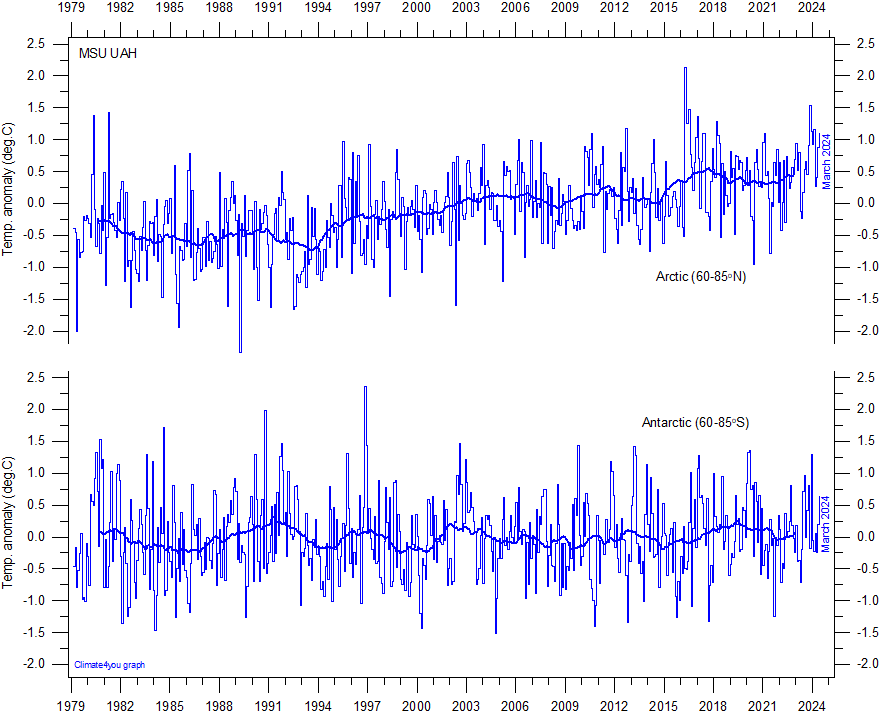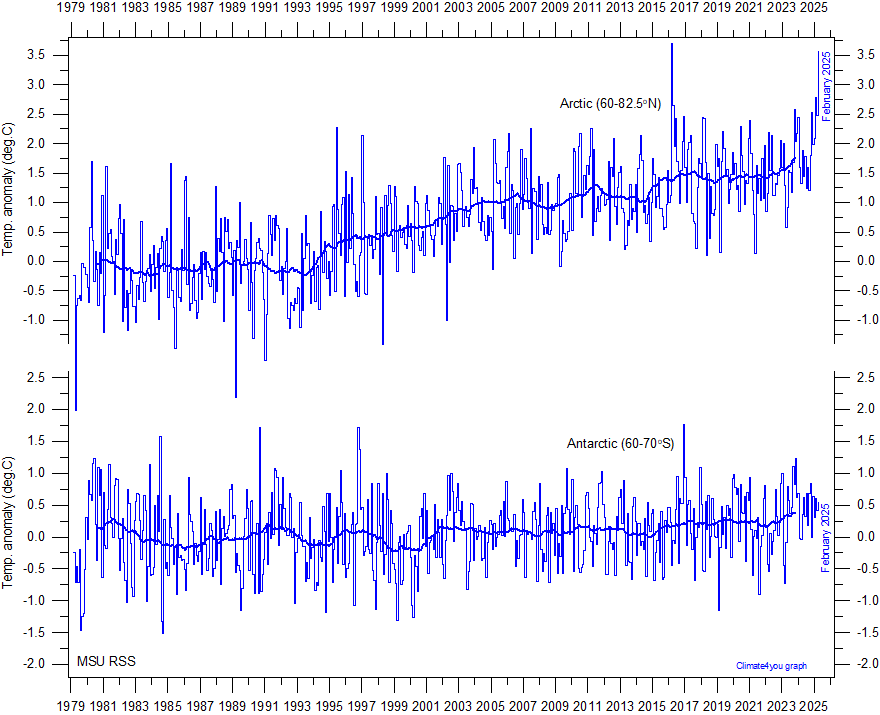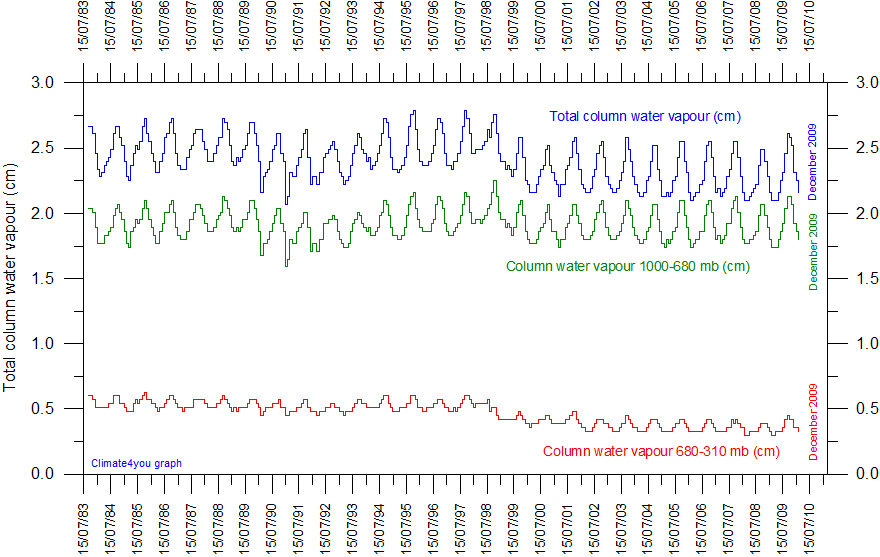
BethesdaWX
-
Posts
6,817 -
Joined
-
Last visited
Content Type
Profiles
Blogs
Forums
American Weather
Media Demo
Store
Gallery
Posts posted by BethesdaWX
-
-
What happened to this place? I miss the days when frivolousz and skierinvermont ran the backbone of the AGW side, at least they bring legitimate science to the table. Now the scientific method has gone up in flames, very sad.
-
Forget whether or not it has warmed over the past decade. Do you think maybe the fact that the globe has gradually warmed ~0.8C and the arctic more than double that in little over a century may have something to do with it? Please try to think longer term when concidering slowly evolving climate changes and feedbacks such as melting glacial ice, melting permafrost and growing ocean heat content.
Sustained warmer conditions answers your question.
You said added warming, or at least that is how I interpreted it. If I misinterpreted you I apologize. And as I believe the reconstructions that show more variance over those that show less, I believe the globe has likely warmed more than 1.5C since 1650.
There was a substantial increase in temperature from the mid 1600s to the late 1700s in most non-tree ring proxies. The three periods of rapid warming continued a net upward trend, with the last warming period from 1978-2006 supposedly caused by Man's CO2 emmisions, if the AGW theory is correct.
-
Wow. So blending GISS, HADCRUT, UAH, RSS, and NCDC together means I'm a denier of (something?)?

-
Don't get me wrong, the stability of the methane hydrates and thawing permafrost are very much a serious issue which stands to exacerbate anthropogenic induced climate change. That this should occur as the arctic continues to warm is to be logically expected, at least along periphery zones where stability is marginal.
Also, I agree that of more immediate concern is the release of methane from melting permafrost. Again, however it is the relatively slow build up of atmospheric methane and conversion to CO2 which will have the long standing impact rather than some sudden release of methane.
Methane release from tropical wet lands and to some degree releases from the arctic may have been sources of Holocene Period natural background methane concentrations. The addition of methane from human activity has contributed to the rise in concentration over the past couple centuries beyond the natural background, while human induced warming may be speeding up the release from natural stores. Time will tell.
How can warming (let alone human caused warming) be causing the release of natural stores of methane across the globe when the globe has not seen any statistically significant warming in the past ~ decade?
What irks me about your post is your breaching of the scientific method, it can be argued many ways as to what is causing the warming, so unobjective comments like this seem to clog up the forum with unscientific banter.
-
They can't even prove man is causing global warming.
This one sentence in your post I think is what needs to be focused on aside from the political stuff. Within the scientific method, CO2 induced warming is a simple hypothesis. In fact, when looking at the data we have, observations, and other mechanisms, it's closer to being "disproven" now than it is "proven", at least when it comes to how the climate system processes changes in LW energy. More work needs to be done on understanding the GHE, total atmospheric conduction body, and the kinetic budget before we declare catastrophe. It is actually quite complicated when it comes to the climate system, and evidence for solar induced change is growing by the day. I'm hoping I find the chance to debate some new findings.
What if I could find something that correlates to every El Nino, every blip in temperature, and even the long term trend in temperature in a stove-kettle relationship? Without going into details, the climate system is all about maintaining equilibrium, and the GHE is never not in equilibrium. If it weren't for CO2 and other GHGes, the global temp would actually be warmer. The answer lies in convection, involving the kinetic budget.
I could rant for hours but I'll cease on that for now.
-
The sattelite measurements do not show that the methane has reached any of the field stations. How can they measure what isn't there?
*satellite*
-
I think albedo feedbacks are part of the game though?
Yes they are, but the issue is albedo loss adds to warming near the surface, while higher up in the troposphere any effect you get is more likely to represent/display changes in GHGes, or at least more than would be seen at the surface.
The AO also needs to be corrected for to get any true GHG signal that would be present.
-
Perhaps in the future. However, issues also exist with satellite measurements e.g., lower troposphere figures have been documented to be partially tainted by stratospheric readings in the past leading to cooler figures relative to the instrument record than might otherwise have been the case.
The error bars on UAH published in peer review for all regions on a decadal scale is +/- 0.05C/decade, and by far it is a more viable method than extrapolating anomalies from outside the arctic, which leads to larger error bars than would be present in UAH data.
The fact that there are error bars present is not a way to scrutinize/discredit a dataset via the scientific method, especially compared to a dataset that has no data in the area of comparison,which would lead to larger error bars.

One rule in science, never alter observations to match a model. That is an immediate breach of the scientific method. Those operating the unversity of colorado sea level satellite readings breach the scientific method every time they "bump up" the trend, latest excuse was "due to observed CO2 increase,the oceans should have expanded by etc" based on model science, changing the observational dataset to reflect models that have been busting continuously in regards to the global temperature since the middle of last decade.
-
But apparently its just Contaminating the data set. Natural changes in surface albedo contaminates the data set. So were told.
If you want to determine the effect of an increase in CO2/Methane alone, then yes changes in albedo, natural or man made, will contaminate the dataset, hiding the "real" signal. How can you deny that?
Maybe you misunderstood me?
-
Given a lack of stations, ships, buoys, etc., it is useful to extrapolate, if extrapolation can be performed skillfully. Fortunately, it can. The estimated error, largely due to lack of spatial coverage, is 0.05°C (95% confidence limit).
http://demeterdesign...0_draft0319.pdf
Regarding Arctic temperatures, here's what the GISS website states:
There are several reasons for the small discrepancies that exist between the three records. Most important, subtleties in the way the scientists from each institution handle regions of the world where temperature-monitoring stations are scarce produce differences.
While developed areas have a dense network of weather stations, temperature monitoring equipment is sparse in some parts of the Amazon, Africa, Antarctica, and Arctic. In the Arctic, particularly, the absence of solid land means there are large areas without weather stations.
The Met Office and the NCDC leave areas of the Arctic Ocean without stations out of their analyses, while GISS approaches the problem by filling in the gaps with data from the nearest land stations, up to a distance of 1200 kilometers (746 miles) away. In this way, the GISS analysis achieves near total coverage in the Arctic.
Both approaches pose problems. By not inferring data, the Met Office assumes that areas without stations have a warming equal to that experienced by the entire Northern Hemisphere, a value that satellite and field measurements suggest is too low given the rate of Arctic sea ice loss.
On the other hand, GISS's approach may either overestimate or underestimate Arctic warming. "There's no doubt that estimates of Arctic warming are uncertain, and should be regarded with caution," Hansen said. "Still, the rapid pace of Arctic ice retreat leaves little question that temperatures in the region are rising fast, perhaps faster than we assume in our analysis."
If satellites suggest that GISS is too cold or too warm then GISS should adjust to match satellites. But GISS's trend has deviated warm from UAH and RSS in the Arctic rather than followed suit. Using the Actual Data is probably the bestway to go.
The LT is the place to measure the impact of Methane release itself and no the Surface, which is subject to contamination fro variation in albedo due to many factors.
-
Don't see the drop looking at a composite.
Unlike UAH/RSS, GISS doesn't have any data in the Arctic, they just extrapolate, and either way it being surface data results in contamination due to variation in albedo while the LT measurements that UAH and RSS do not have as big a contamination signal.
-
Methane increased dramatically from 1979 to 1994...the Arctic atmosphere cooled during that time...when methane began leveling off is when temps began warming...Irony says hi, Arctic temps now in a little downward blip, coinciding with the methane spike...
Does that answer things?



Ironic(?) too that total column water vapor correlates inversely to global temps. Or does it make sense given the GHE drives convection and less water vapor = less low cloud cover and convective potential.

-
This thread is actually filled with a ton of information with tons of legit science backup. Everyone participitating has learned who chooses to learn in many ways about CH4 in this thread. Where it comes from, how strong it is, how the measuring process works, how much is there out there?, how legit the threat is, upper atmospheric charts and methane analysis, what are the wind patterns that carry CH4 as well as other GHGS throught the atmosphere, why did methane stop rising for a while, why is it rising again, how long has it been rising, how far back does the rising go, what are the implications of this, does the sea ice reduction play a role, how much of a role does solar insolation play, will we see more of this in 2012, 13, 14?
I can go on and on. This thread is loaded with incredible amounts of information so either you already know all of it which is doubtful, or your not in the thread to learn it.
I never denied it was full of good info...good info that was posted to refute nonfactual claims that also ruined my UAH thread. Those who originally posted the good info in this thread were bashed and ridiculed, for doing good research and thinking rationally and objectively..
This happens here quite alot, it is somewhat irritating.
-
This thread is an alarmist disaster. Come on.
-
THIS IS NOT GOOD, WE MUST DO SOMETHING.
-
I never said you made it up, I said it is not recent. A huge difference. Christy et al 2011 is not recent by any stretch of the term - it is old news and has been thorougly debunked. You claimed in clear, unambiguous language that there is "New peer reviewed literature by John Christy and Roy Spencer". All you have to do to put this whole issue to rest is to provide the link to the paper(s) you were referring to. Were you telling the truth (in which case you can easily provide the links) or was your claim a complete fabrication?
If you understand the scientific method at all you know that all claims require supporting data. You have not provided the data to support your claim so you have failed to follow the scientific method. Even a child (or teenager) could understand that, and that is the failure I referred to.
HUH? You CLEARLY had asserted that I was lying about christy et al 2011 existing.
You said I invented it, now it suddenly exists, but it's debunked crap? Do you even know what the paper is about? Dude you're out of your mind.You have simply been caught telling a lie on this forum.Find me one paper that "debunks" it.
-
Why did you decide that a topic about methane venting in the arctic was about you?
I didn't, you did with your false assertion about me.
I'm done with this thread-trashing nonsense. Either the paper exists, or Roy Spencer is a backtabbing liar towards his colleagues, inventing papers. (lol)
If you want to keep your thread clean, think twice about spreading BS intentionally and expecting no response.
-
Where is the link?
I don't know where it is because I haven't looked. I quoted Spencer's reference to the paper, thats all, and he is not going to blatantly make up a paper with his colleague as the Author.
I don't even know why you even want the paper given it is not relavent to my thread, let alone me finding it for you.
If Roy Spencer invented an imaginary paper to decieve the public, thats on him, not me.
-
Another link to "fundanomics the free market simplified"
This is spam
I don't know if this is your idea of trolling or not, but whatever it is you're not good at it.
The paper exists, I did not make it up, unless Roy Spencer is lying. Is he lying?
-
You claimed that there is new peer-reviewed literature - none of the papers Dr Spencer referenced are new. So you still haven't backed up your assertion. Another FAIL on your part. And failing to produce data to back up an assertion is certainly defying the scientific method.
???
You said I made up Christy et al 2011, I just proved you wrong, in showing you that Roy Spencer referenced it.
How is that a fail on my part?
-
Please, the subject is arctic methane venting. the 5049 people who have viewed this topic, are interested in this topic. Not what tin foil to wear as a hat.
Then why did you go off topic and accuse me of making up a paper, first? I'm going to respond to that nonsense whether you like it or not.
-
-
It kind of looks like a link, but you click on it, and nothing happens.
I quoted the reference..so is Roy Spencer inventing papers or not? I haven't read it, and it was never directly relevant to my original post anyway.
-
You know what here you go since you're having trouble:
So, the model vs. observational issue was not presented accurately in the post. This has been addressed in the peer reviewed literature by us and others (Christy et al. 2007, 2010, 2011, McKitrick et al. 2010, Klotzbach et al. 2009, 2010.)

This is not good.
in Climate Change
Posted
Lay off the Thai food, bruh.